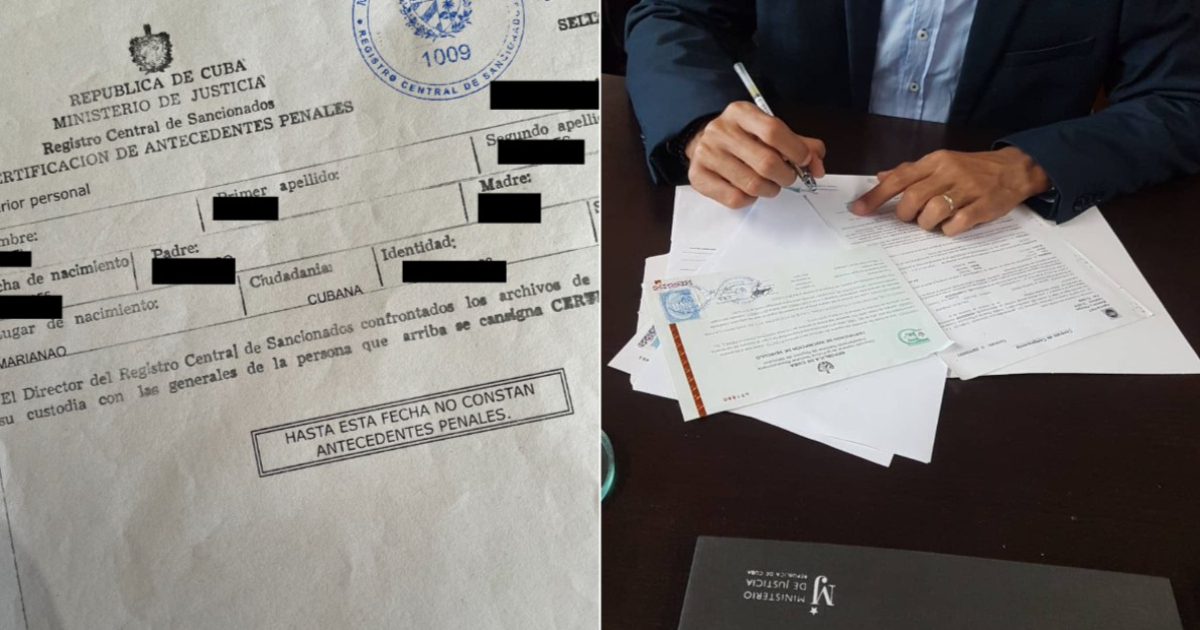The International Consultants and Lawyers Office (Conabi) in Havana will start offering an online service for obtaining and legalizing criminal records beginning this Monday.
Sandra Rodríguez, president and general director of Conabi, introduced the new initiative to the Cuban News Agency (ACN), as reported by the newspaper Escambray. Rodríguez described the service as an "achievement," highlighting that clients will no longer need to schedule appointments and can complete the process anytime and from anywhere using their computers or mobile devices.
Without addressing the technological and connectivity limitations that many citizens face, Rodríguez mentioned that interested individuals must create a user account at http://www.conabi.cu. From there, they can request the obtaining and legalization of their criminal records.
According to Rodríguez, payments will be made through the national gateways Transfermóvil and EnZona. The fees cover both the service cost and the price of the stamp, after which Conabi will proceed with obtaining and legalizing the criminal records.
Clients can track the status of their application through the law firm's website, and will only need to visit the institution to pick up their documents. The document delivery will be managed independently from the rest of the institution's services.
Rodríguez boasted that the implementation of this online service will allow clients to conduct their business more conveniently without the need to appear in person, which she claimed would ease the burden on the law firm's appointment system. Additionally, she noted that Conabi's internal management would become faster and more accurate, with a lower margin of error. Plans are also in place to extend this service to Cubans abroad, who would pay through an international platform.
Lastly, Rodríguez emphasized that the new service was developed in collaboration with the private tech company Futura Sit, with which Conabi has maintained agreements since 2022. This service is integrated within the corporate modules of Legalsit, software designed for the comprehensive management of legal services.
During the initial phase, the project will be limited to accepting 50 requests per week as part of a pilot test, explained Leslie Carrodeguas, Conabi's Marketing and Communication specialist, to the ACN. The goal of this measure is to refine the implemented mechanisms for this service and progressively increase response capacity as the system solidifies.
Carrodeguas also mentioned that clients can only request the obtaining and legalization of criminal record certifications for themselves and for relatives up to the fourth degree of consanguinity, including parents, children, grandchildren, spouses or domestic partners, grandparents, siblings, uncles, and nephews, in accordance with the current policy for legalizing all types of documents.
Conabi has determined, in line with Law 149/2022 "On Personal Data Protection" and its complementary norms, that it is the applicant's responsibility to ensure they have the necessary authorization from the document holder before requesting, obtaining, legalizing, collecting, and using the information for the intended purposes, always with the prior approval of the holder.
The fees will remain the same as for in-person applications: 1,250 CUP for obtaining and 375 CUP for legalization. The value of the stamps varies based on the holder's residence: for residents in Cuba, the tax is five CUP for obtaining and 20 CUP for legalization; for those residing abroad, the cost is 125 CUP for obtaining and 500 CUP for legalization, according to the ACN.
In May, after a year in which the Ministry of Foreign Affairs (MINREX) acknowledged delays in document legalization, Cuban Foreign Minister Bruno Rodríguez Parrilla assured that these delays had been reversed. The minister stated that "the situation of delays that the document legalization service presented has been reversed," indicating a positive outcome from "the measures adopted since last year."
The increase in document legalization requests by Cubans at the MINREX, along with constant delays, has led the Cuban government to consider joining the Hague Apostille Convention, Rodríguez mentioned in March.
During a Roundtable discussion, the minister addressed the projections of Cuban foreign policy, with a significant focus on the situation with document legalization, a process highly demanded by the population and criticized for its slow pace.
Frequently Asked Questions about Conabi's New Online Service
Here are some common questions and answers about Conabi's new online service for obtaining and legalizing criminal records in Cuba.
How can I access Conabi's online service for criminal records?
You need to create a user account at http://www.conabi.cu to request the service.
What payment methods are accepted for this service?
Payments can be made through the national gateways Transfermóvil and EnZona.
Can I request criminal record legalization for my relatives?
Yes, you can request it for yourself and for relatives up to the fourth degree of consanguinity.
What are the costs associated with this service?
The fees are 1,250 CUP for obtaining and 375 CUP for legalization. Stamp costs vary based on residence.
